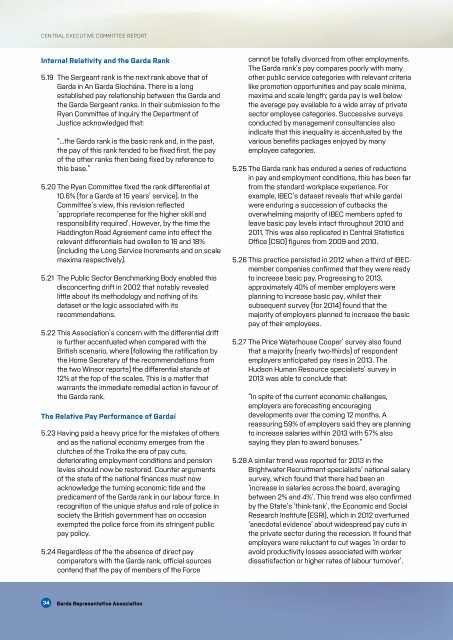Conference Report 2016
Table of contents contains links on page 5. It can be used to skip through chapters.
Table of contents contains links on page 5. It can be used to skip through chapters.
You also want an ePaper? Increase the reach of your titles
YUMPU automatically turns print PDFs into web optimized ePapers that Google loves.
CENTRAL EXECUTIVE COMMITTEE REPORT<br />
Internal Relativity and the Garda Rank<br />
5.19 The Sergeant rank is the next rank above that of<br />
Garda in An Garda Síochána. There is a long<br />
established pay relationship between the Garda and<br />
the Garda Sergeant ranks. In their submission to the<br />
Ryan Committee of Inquiry the Department of<br />
Justice acknowledged that:<br />
“...the Garda rank is the basic rank and, in the past,<br />
the pay of this rank tended to be fixed first, the pay<br />
of the other ranks then being fixed by reference to<br />
this base.”<br />
5.20 The Ryan Committee fixed the rank differential at<br />
10.6% (for a Garda at 15 years’ service). In the<br />
Committee’s view, this revision reflected<br />
‘appropriate recompense for the higher skill and<br />
responsibility required’. However, by the time the<br />
Haddington Road Agreement came into effect the<br />
relevant differentials had swollen to 16 and 18%<br />
(including the Long Service Increments and on scale<br />
maxima respectively).<br />
5.21 The Public Sector Benchmarking Body enabled this<br />
disconcerting drift in 2002 that notably revealed<br />
little about its methodology and nothing of its<br />
dataset or the logic associated with its<br />
recommendations.<br />
5.22 This Association’s concern with the differential drift<br />
is further accentuated when compared with the<br />
British scenario, where (following the ratification by<br />
the Home Secretary of the recommendations from<br />
the two Winsor reports) the differential stands at<br />
12% at the top of the scales. This is a matter that<br />
warrants the immediate remedial action in favour of<br />
the Garda rank.<br />
The Relative Pay Performance of Gardaí<br />
5.23 Having paid a heavy price for the mistakes of others<br />
and as the national economy emerges from the<br />
clutches of the Troika the era of pay cuts,<br />
deteriorating employment conditions and pension<br />
levies should now be restored. Counter arguments<br />
of the state of the national finances must now<br />
acknowledge the turning economic tide and the<br />
predicament of the Garda rank in our labour force. In<br />
recognition of the unique status and role of police in<br />
society the British government has on occasion<br />
exempted the police force from its stringent public<br />
pay policy.<br />
5.24 Regardless of the the absence of direct pay<br />
comparators with the Garda rank, official sources<br />
contend that the pay of members of the Force<br />
cannot be totally divorced from other employments.<br />
The Garda rank’s pay compares poorly with many<br />
other public service categories with relevant criteria<br />
like promotion opportunities and pay scale minima,<br />
maxima and scale length; garda pay is well below<br />
the average pay available to a wide array of private<br />
sector employee categories. Successive surveys<br />
conducted by management consultancies also<br />
indicate that this inequality is accentuated by the<br />
various benefits packages enjoyed by many<br />
employee categories.<br />
5.25 The Garda rank has endured a series of reductions<br />
in pay and employment conditions, this has been far<br />
from the standard workplace experience. For<br />
example, IBEC’s dataset reveals that while gardaí<br />
were enduring a succession of cutbacks the<br />
overwhelming majority of IBEC members opted to<br />
leave basic pay levels intact throughout 2010 and<br />
2011. This was also replicated in Central Statistics<br />
Office (CSO) figures from 2009 and 2010.<br />
5.26 This practice persisted in 2012 when a third of IBECmember<br />
companies confirmed that they were ready<br />
to increase basic pay. Progressing to 2013,<br />
approximately 40% of member employers were<br />
planning to increase basic pay, whilst their<br />
subsequent survey (for 2014) found that the<br />
majority of employers planned to increase the basic<br />
pay of their employees.<br />
5.27 The Price Waterhouse Cooper’ survey also found<br />
that a majority (nearly two-thirds) of respondent<br />
employers anticipated pay rises in 2013. The<br />
Hudson Human Resource specialists’ survey in<br />
2013 was able to conclude that:<br />
“In spite of the current economic challenges,<br />
employers are forecasting encouraging<br />
developments over the coming 12 months. A<br />
reassuring 59% of employers said they are planning<br />
to increase salaries within 2013 with 57% also<br />
saying they plan to award bonuses.”<br />
5.28 A similar trend was reported for 2013 in the<br />
Brightwater Recruitment specialists’ national salary<br />
survey, which found that there had been an<br />
‘increase in salaries across the board, averaging<br />
between 2% and 4%’. This trend was also confirmed<br />
by the State’s ‘think-tank’, the Economic and Social<br />
Research Institute (ESRI), which in 2012 overturned<br />
‘anecdotal evidence’ about widespread pay cuts in<br />
the private sector during the recession. It found that<br />
employers were reluctant to cut wages ‘in order to<br />
avoid productivity losses associated with worker<br />
dissatisfaction or higher rates of labour turnover’.<br />
34 Garda Representative Association




